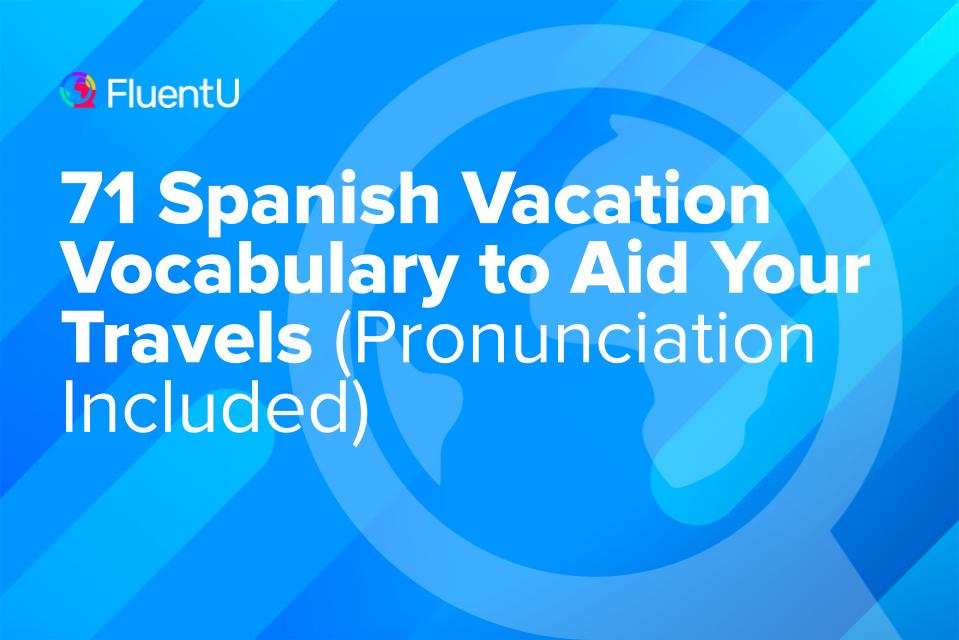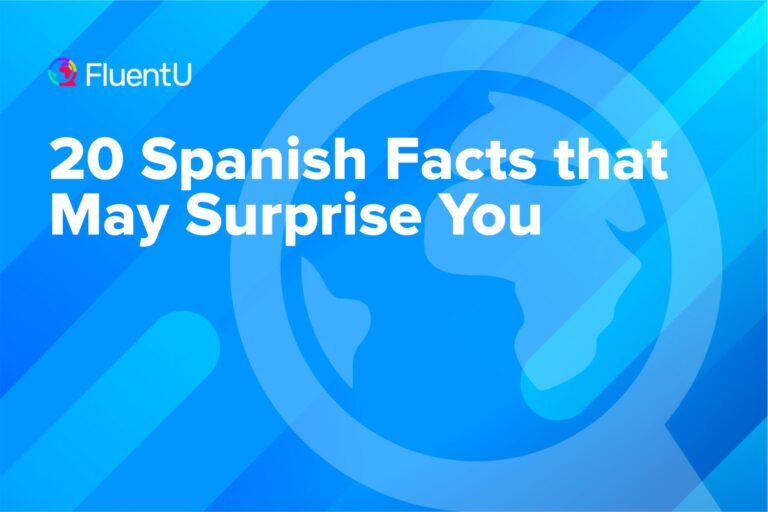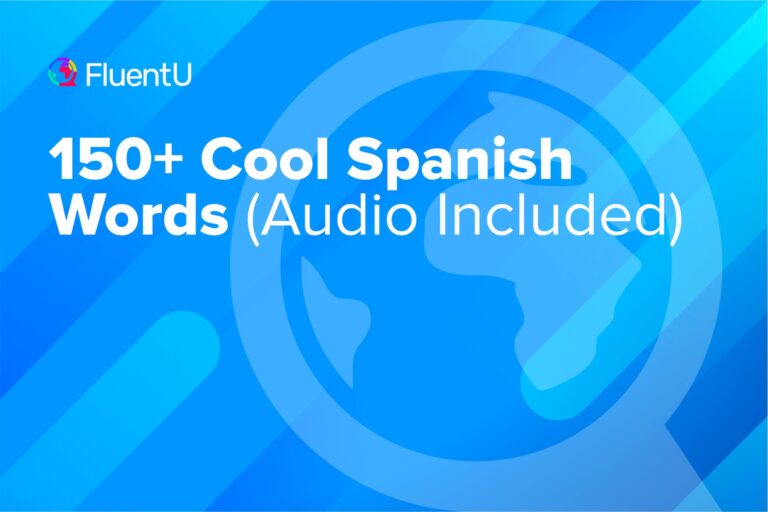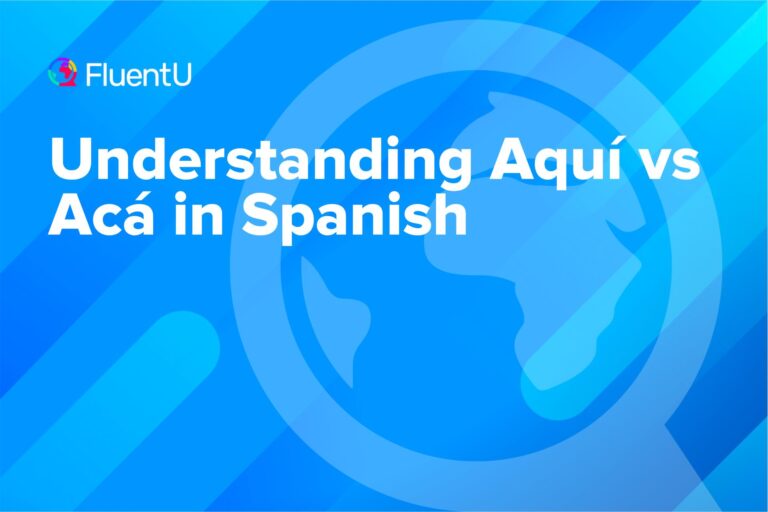Contents
- Spanish Vacation Nouns
- 1. el recuerdo (the souvenir)
- 2. el regalo (the present, the gift)
- 3. el billete de ida y vuelta (the round-trip ticket)
- 4. la maleta (the suitcase, the bag)
- 5. el pasaporte (the passport)
- 6. el DNI (ID card)
- 7. el turista (the tourist, the vacationer)
- 8. el paisaje (the landscape)
- 9. el avión (the plane)
- 10. el coche (the car)
- 11. la gasolina (the gasoline, the fuel)
- 12. la gasolinera (the gas station)
- 13. las vistas (the view)
- 14. la playa (the beach)
- 15. el museo de… (the museum of…)
- 16. el cine (the movie theater)
- 17. la piscina (the swimming pool)
- 18. el mar (the sea)
- 19. el concierto (the concert)
- 20. las gafas de sol (the sunglasses)
- 21. la cámara de fotos (the photo camera)
- 22. la videocámara (the video camera)
- 23. las sandalias / las chanclas (the flip-flops, the sandals)
- 24. la agencia de viajes (the travel agency)
- 25. las llaves (the keys)
- 26. el helado (the ice cream)
- 27. la heladería (the ice cream parlor)
- 28. la tumbona (the lounger)
- 29. la terraza (the terrace)
- 30. el flotador (the float, the rubber ring)
- 31. la Oficina de Turismo (the Tourist Information Office)
- 32. la farmacia (the drugstore, the pharmacy)
- 33. la tarjeta de crédito / la tarjeta de débito (the credit/debit card)
- 34. el cajero automático (the ATM machine)
- 35. la avería (the breakdown)
- 36. el carné / el permiso de conducir (the driver’s license)
- 37. la queja / la reclamación (the complaint)
- 38. la sombrilla (the shade, the umbrella)
- 39. la escala (the stopover)
- 40. el auxiliar de vuelo (the flight attendant)
- 41. la tripulación (the crew)
- 42. la habitación individual / la habitación doble (the single/double/twin room)
- 43. el secador de pelo (the hairdryer)
- 44. la atracción turística (the tourist attraction)
- 45. la ciudad (the city)
- 46. el casco antiguo (the old town, the historic center)
- Spanish Vacation Verbs
- 47. viajar , ir de viaje , hacer un viaje (to travel, to go on a trip)
- 48. ir de vacaciones (to go on vacation)
- 49. pasar las vacaciones (to vacation)
- 50. estar de vacaciones (to be on vacation)
- 51. hacer fotos / tomar fotos / sacar fotos (to take pictures)
- 52. montar a caballo (to go horseback riding, to ride a horse)
- 53. hacer una excursión , ir de excursión (to go for a ramble/a hike)
- 54. hacer una reserva , reservar (to make a reservation, to book)
- 55. confirmar una reserva (to confirm a reservation/booking)
- 56. ir de camping (to go camping)
- 57. hacer las maletas (to pack, to pack your luggage)
- 58. visitar (to visit, to tour, to see, to go, to pay a visit)
- 59. tomar un taxi (to take a taxi)
- 60. quedarse (to stay, like at a hotel)
- 61. descansar (to rest, to relax)
- 62. alquilar (to rent)
- 63. hacer un castillo de arena (to build a sandcastle)
- 64. leer un libro (to read a book)
- 65. divertirse , disfrutar , pasárselo bien (to have fun, to have a blast, to enjoy oneself)
- 66. ir de compras (to go shopping)
- 67. hacer turismo (to sightsee)
- 68. ver los lugares de interés (to visit places of interest)
- 69. dar un paseo (to go for a walk)
- 70. hacer una barbacoa (to barbecue)
- 71. hacer un picnic (to have a picnic)
- And One More Thing…
71 Spanish Vacation Vocabulary to Aid Your Travels (Pronunciation Included)

So you’ve decided to travel to a Spanish-speaking country. Your luggage is ready, your passport is up-to-date, your trip has been booked, but are you ready to have your first real-life conversation in Spanish?
Whether you’re going to spend the next few weeks on the beach, in the mountains or even underground, you’ll find the words you need here.
Download: This blog post is available as a convenient and portable PDF that you can take anywhere. Click here to get a copy. (Download)
Spanish Vacation Nouns
1. el recuerdo (the souvenir)
Recuerdo comes from the verb recordar , which means to remember. That is why a memory is also called a recuerdo in Spanish!
2. el regalo (the present, the gift)
They say “the present is a gift.” In Spanish, this can be said el presente es un regalo or even el presente es un presente .
3. el billete de ida y vuelta (the round-trip ticket)
You can buy the whole round-trip ticket, or un billete de ida (a one-way ticket) and un billete de vuelta (a return ticket).
Bear in mind that billete is used in Spain, while Latin American countries will typically use boleto or pasaje , depending on the country.
4. la maleta (the suitcase, the bag)
I think this is one of those funny words every language has.
If you use it in the singular, it is translated as “suitcase.” Each individual bag you have is a maleta.
However, if you use it in the plural, you can translate it as “luggage” or “baggage.” You do not have to count how many suitcases you have (unless you want to). You can just refer to all of them as a whole:
Dame esa maleta. (Give me that suitcase.)
¿Están listas tus maletas? (Is your luggage ready?)
5. el pasaporte (the passport)
Never forget your passport or ID when leaving home, let alone when leaving your country!
6. el DNI (ID card)
DNI means Documento Nacional de Identidad (National Identity Document). I know you probably do not have one (yet), but if you are traveling to, say, Spain, do not expect people to say ID. For us, any ID is a DNI (deh-eneh-ih), and that is how we will say it to you.
Many European people have passports, but now you are able to travel throughout the whole European Union ( viajar por toda la Unión Europea ) by using just your European ID.
However, if you come from America, you will need a passport or a visa ( un visado in Castilian Spanish, also referred to as una visa in some Latin American countries).
A typical sentence you will hear when checking in is:
DNI o pasaporte, por favor. (ID card or passport, please.)
This may sound rude to you, but it is not. Despite being in the form of an order, it is rather a shorter way of asking:
¿Puede mostrarme su DNI o su pasaporte, por favor? (Could you show me your ID card or passport, please?)
7. el turista (the tourist, the vacationer)
This Spanish word is very similar to its English counterpart, so it should not be problematic at all.
Just remember that nouns ending in -ista do not have a specific feminine form. Male and female tourists are both called turistas . You just change the determiners and any other accompanying word:
el turista / la turista , los turistas / las turistas (the tourist, the tourists)
este turista / esta turista , estos turistas / estas turistas (this tourist, these tourists)
un turista español / una turista española , unos turistas españoles / unas turistas españolas (a Spanish tourist, some Spanish tourists)
8. el paisaje (the landscape)
9. el avión (the plane)
10. el coche (the car)
For more information about the word “car” and its different translations into Spanish, such as carro and auto , take a moment to learn your Spanish transportation terms.
11. la gasolina (the gasoline, the fuel)
Gasolina is a word normally used to refer to any kind of fuel for your car in general. However, we also use it to specifically refer to gasoline.
If your car uses diesel, do not use gasolina! Choose the gasóleo or gasoil dispenser.
12. la gasolinera (the gas station)
Since gasolina is used to refer to fuel in general, you fill your tank at the gasolinera.
13. las vistas (the view)
You can use this word in its plural form if you are talking about landscapes. The singular form la vista normally refers to our sight, although you can use it to talk about the view too:
La vista desde esta ventana es muy bonita. (The view from this window is very pretty.)
14. la playa (the beach)
What can I say? Let’s go to the playa!
15. el museo de… (the museum of…)
You can always find a museum that appeals to you. Always! Some of my favorites are:
El museo de Ciencias (The Science Museum)
El museo de Etnología (The Museum of Ethnology)
El museo de Arte Moderno (The Museum of Modern Art)
16. el cine (the movie theater)
17. la piscina (the swimming pool)
For people like me who love traveling during the winter, I recommend visiting a piscina cubierta (an indoor pool).
Note that it’s also common to hear the word alberca used to say “swimming pool” in Mexico and some Central American countries.
18. el mar (the sea)
19. el concierto (the concert)
If you travel to Barcelona, do not miss the conciertos al aire libre (open-air concerts). They are simply great!
20. las gafas de sol (the sunglasses)
Note that you may also hear the term lentes used to refer to sunglasses (and also eyeglasses) in some countries in Latin America.
21. la cámara de fotos (the photo camera)
22. la videocámara (the video camera)
Let’s be honest, many people these days do not use photo or video cameras anymore. We use our cell phones to record our memories now, but you can still learn what these words mean.
23. las sandalias / las chanclas (the flip-flops, the sandals)
24. la agencia de viajes (the travel agency)
25. las llaves (the keys)
It does not matter if we are talking about your house keys ( las llaves de tu casa ), the keys of the apartment you have booked ( las llaves del apartamento que has alquilado ) or the hotel key card ( la tarjeta llave del hotel ), just do not lose any of them, please!
26. el helado (the ice cream)
27. la heladería (the ice cream parlor)
28. la tumbona (the lounger)
This is the kind of lounger you would use by the pool, on the beach, in your garden, etc. Tumbona comes from the verb tumbarse , which means to lie down.
29. la terraza (the terrace)
30. el flotador (the float, the rubber ring)
What about manguitos (arm floats)? Do you think you will need them?
31. la Oficina de Turismo (the Tourist Information Office)
32. la farmacia (the drugstore, the pharmacy)
Depending on where you are traveling to, you may also hear people call the drugstore la botica .
33. la tarjeta de crédito / la tarjeta de débito (the credit/debit card)
34. el cajero automático (the ATM machine)
Remember to always print or ask for your comprobante (receipt, slip) when using an ATM machine!
35. la avería (the breakdown)
Avería comes from averiarse (to break down). I hope you do not have problems with your car, but just in case, remember the following:
Mi coche se ha averiado. (My car has broken down.)
Necesito una grúa. (I need a tow truck.)
Disculpe, mi coche se ha averiado. ¿Puede llamar a una grúa, por favor? (Excuse me, my car has broken down. Could you please call a tow truck?)
36. el carné / el permiso de conducir (the driver’s license)
There is no difference in Spanish between these two terms. Both refer to the document you should keep with you at all times while driving!
37. la queja / la reclamación (the complaint)
Presentar una reclamación means “to file a complaint”—but let’s hope there is no need for this!
38. la sombrilla (the shade, the umbrella)
Sombrilla literally means “little shadow.”
39. la escala (the stopover)
Here is how you would use this one:
Hago escala en Buenos Aires. (I’m stopping over in Buenos Aires.)
40. el auxiliar de vuelo (the flight attendant)
41. la tripulación (the crew)
42. la habitación individual / la habitación doble (the single/double/twin room)
You can also choose the type of bed you want:
la cama individual (the single bed)
la cama de matrimonio / la cama doble (the double/queen bed)
43. el secador de pelo (the hairdryer)
You can ask at your hotel:
¿Hay secador de pelo en el cuarto de baño? (Is there a hairdryer in the bathroom?)
44. la atracción turística (the tourist attraction)
45. la ciudad (the city)
46. el casco antiguo (the old town, the historic center)
Remember that many cities do not allow cars into their historic centers. Look for any Calle Peatonal (Pedestrian Street) sign, just in case!
Spanish Vacation Verbs
47. viajar , ir de viaje , hacer un viaje (to travel, to go on a trip)
These three verbs mean exactly the same, but bear in mind their construction is very different:
Voy a viajar a Madrid. (I am going to travel/go on a trip to Madrid.)
Voy a ir de viaje a Madrid. (I am going to travel/go on a trip to Madrid.)
Voy a hacer un viaje a Madrid. (I am going to travel/go on a trip to Madrid.)
48. ir de vacaciones (to go on vacation)
49. pasar las vacaciones (to vacation)
50. estar de vacaciones (to be on vacation)
I know these three last verbs are pretty similar, but they are used in different contexts, just like in English:
Voy a ir de vacaciones a Perú. (I’m going to go on vacation to Peru.)
Estoy pasando las vacaciones en Perú. (I am vacationing in Peru.)
Estoy de vacaciones en Perú. (I am on vacation in Peru.)
51. hacer fotos / tomar fotos / sacar fotos (to take pictures)
Remember that in some places you are not allowed to use the flash ( no puedes usar el flash ).
52. montar a caballo (to go horseback riding, to ride a horse)
53. hacer una excursión , ir de excursión (to go for a ramble/a hike)
54. hacer una reserva , reservar (to make a reservation, to book)
You can use these two verbs interchangeably, but you had better remember that depending on the one you use, you might have to use a preposition. Besides that, the sentence construction looks a little different.
Have a look:
He hecho una reserva de hotel para dos personas. (I have made a hotel reservation for two people.)
He reservado un hotel para dos personas. (I have made a hotel reservation for two people.)
55. confirmar una reserva (to confirm a reservation/booking)
I highly recommend ( te recomiendo encarecidamente ) that you confirm all your bookings before starting your trip.
You would not want to arrive in a foreign country and realize you have no place to sleep ( no tienes un lugar donde dormir )!
56. ir de camping (to go camping)
Oh, look! An English word! Yes, we have more and more English words in Spanish!
However, if you want to be super Spanish when in a Spanish-speaking country, say acampar (to go camping) instead of ir de camping.
They both mean exactly the same, but I am sure people will be quite impressed with your Spanish skills!
57. hacer las maletas (to pack, to pack your luggage)
We “do” the suitcases in Spanish, because… why not?
58. visitar (to visit, to tour, to see, to go, to pay a visit)
Visitar is one of those verbs which, depending on the object, will or will not need the personal a. Remember the rule: if the object is alive, you need the personal a:
Me gusta visitar museos. (I like going to museums.)
Ayer visité a mi hermana. (I visited my sister yesterday.)
59. tomar un taxi (to take a taxi)
You can watch the lesson from our YouTube channel below to learn how to actually take a taxi in Spanish:
60. quedarse (to stay, like at a hotel)
Watch out when using this verb, because it has different forms with very different meanings. Here you have some of them:
Quedarse (to stay at a place):
Nos quedamos en un hotel. (We stayed at a hotel.)
Quedar + noun or time (to remain, to be left):
No quedan cervezas. (There are no beers left.)
Quedan dos minutos. (There are two minutes left.)
Quedar (to arrange to meet):
Quedamos a las cinco. (We arranged to meet at five.)
Quedar bien a alguien / Quedar mal a alguien. (to look good on somebody/to look bad on somebody):
Esta camisa no me queda bien. (This shirt doesn’t look good on me.)
61. descansar (to rest, to relax)
62. alquilar (to rent)
More and more tourists are deciding to rent an apartment ( alquilar un apartamento ) for vacation rather than stay at a hotel.
It allows them to save money ( ahorrar dinero ) and they get much more freedom to do what they want, when they want ( hacer lo que quieran cuando quieran ).
Note that you may also hear the verbs arrendar or rentar used in some Latin American countries to say “to rent.”
63. hacer un castillo de arena (to build a sandcastle)
64. leer un libro (to read a book)
65. divertirse , disfrutar , pasárselo bien (to have fun, to have a blast, to enjoy oneself)
You can use these three verbs interchangeably, but remember that pasárselo bien is a reflexive verb and has the object pronoun lo (or la in Latin American Spanish: pasársela bien ).
Bear this in mind when you conjugate it:
| Pasárselo bien (Castilian Spanish) | Pasársela bien (Latin American Spanish) | English translation |
|---|---|---|
| Yo me lo paso bien | Yo me la paso bien | I have fun |
| Tú te lo pasas bien | Tú te la pasas bien | You have fun |
| Él / Ella se lo pasa bien | Él / Ella se la pasa bien | He/She has fun |
| Nosotros nos lo pasamos bien | Nosotros nos la pasamos bien | We have fun |
| Vosotros os lo pasáis bien | Ustedes se la pasan bien | You [plural] have fun |
| Ellos / Ellas se lo pasan bien | Ellos / Ellas se la pasan bien | They have fun |
Note that vosotros is not used in Latin American Spanish. You should use ustedes instead.
66. ir de compras (to go shopping)
67. hacer turismo (to sightsee)
In Spanish, we say “to make tourism,” which may sound quite weird but it is not that crazy when you think about it!
68. ver los lugares de interés (to visit places of interest)
This verb is equivalent to visitar las atracciones turísticas (to visit the tourist attractions).
69. dar un paseo (to go for a walk)
70. hacer una barbacoa (to barbecue)
71. hacer un picnic (to have a picnic)
And while having a picnic, we say goodbye to this post.
Don’t feel overwhelmed by the amount of new words here. You don’t need to learn them all at once. Commit to learning five or ten per day and you’ll have them learned in no time! And to make sure the new words stick, try learning in context instead of simply rote learning them all.
One resource which combines memory techniques with in-context learning is the app and website FluentU, where you can reinforce vacation words by creating your own multimedia flashcards.
FluentU takes authentic videos—like music videos, movie trailers, news and inspiring talks—and turns them into personalized language learning lessons.
You can try FluentU for free for 2 weeks. Check out the website or download the iOS app or Android app.
P.S. Click here to take advantage of our current sale! (Expires at the end of this month)

I hope you have enjoyed this trip to “Spanish vacation vocabulary” station.
See you next time!
Download: This blog post is available as a convenient and portable PDF that you can take anywhere. Click here to get a copy. (Download)
And One More Thing…
If you've made it this far that means you probably enjoy learning Spanish with engaging material and will then love FluentU.
Other sites use scripted content. FluentU uses a natural approach that helps you ease into the Spanish language and culture over time. You’ll learn Spanish as it’s actually spoken by real people.
FluentU has a wide variety of videos, as you can see here:

FluentU brings native videos within reach with interactive transcripts. You can tap on any word to look it up instantly. Every definition has examples that have been written to help you understand how the word is used. If you see an interesting word you don’t know, you can add it to a vocab list.

Review a complete interactive transcript under the Dialogue tab, and find words and phrases listed under Vocab.

Learn all the vocabulary in any video with FluentU’s robust learning engine. Swipe left or right to see more examples of the word you’re on.

The best part is that FluentU keeps track of the vocabulary that you’re learning, and gives you extra practice with difficult words. It'll even remind you when it’s time to review what you’ve learned. Every learner has a truly personalized experience, even if they’re learning with the same video.
Start using the FluentU website on your computer or tablet or, better yet, download the FluentU app from the iTunes or Google Play store. Click here to take advantage of our current sale! (Expires at the end of this month.)







